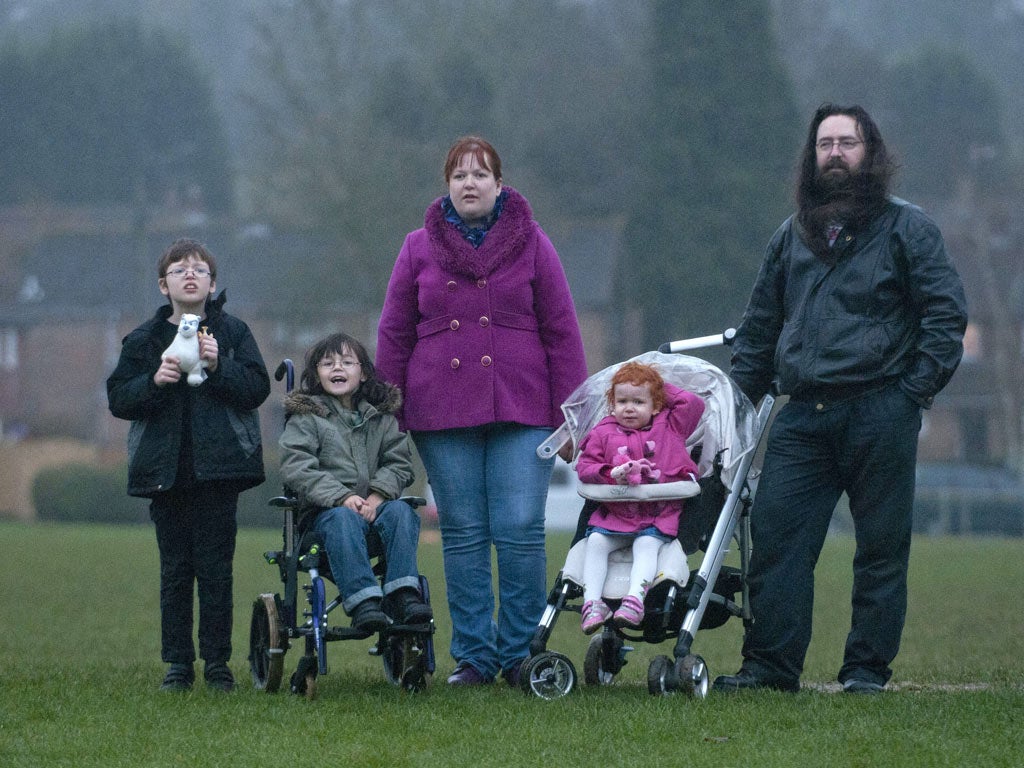Parents of disabled children furious at cuts to allowances
Families say Government has to rethink sweeping reforms that will plunge vulnerable into poverty

Your support helps us to tell the story
From reproductive rights to climate change to Big Tech, The Independent is on the ground when the story is developing. Whether it's investigating the financials of Elon Musk's pro-Trump PAC or producing our latest documentary, 'The A Word', which shines a light on the American women fighting for reproductive rights, we know how important it is to parse out the facts from the messaging.
At such a critical moment in US history, we need reporters on the ground. Your donation allows us to keep sending journalists to speak to both sides of the story.
The Independent is trusted by Americans across the entire political spectrum. And unlike many other quality news outlets, we choose not to lock Americans out of our reporting and analysis with paywalls. We believe quality journalism should be available to everyone, paid for by those who can afford it.
Your support makes all the difference.Six-year-old Rhys Ford loves to go horse-riding. He has autism, attention deficit hyperactivity disorder and hypermobility, a condition of the joints which means he needs a wheelchair to get around.
Rhys's parents use part of his disability living allowance (DLA) to pay £20 a week for his classes at a riding school because horses make him feel calm. But from next April, Rhys and nearly 200,000 other disabled children will no longer be eligible for DLA top-up payments which cover the extra costs that improve their quality of life and help children to reach their potential.
Emma and Chris Ford, of Horsham, West Sussex, are full-time carers for Rhys and their two other disabled children, Martin, seven, and three-year-old Caitlin. They say they feel scared, because the family will lose £200 a month unless the Government drops what has become one of the most controversial proposals of its sweeping welfare reforms. "I have no idea what we can cut out," Mrs Ford said yesterday.
Disability charities such as Contact a Family are urging the House of Lords, which will today debate the Welfare Bill for the last time, to reject the reduction in top-up payments for disabled children on lower and middle rates of DLA. The charity's analysis has found that these cuts, along with subsequent changes to housing benefit, will leave tens of thousands of families with disabled children up to £3,000 a year worse off. A coalition of charities called Every Disabled Child Matters says the Government has failed fully to assess the impact of the proposal, which it claims will plunge thousands of families with disabled children into poverty.
The top-up payments were designed to meet additional costs, such as transport, heating, laundry, nappies and extra clothes that families have because of a child's disability. The Department for Work and Pensions insists the introduction of a new Universal Credit payment will simplify the system and "there will be no cash losers". Those children with higher rate DLA top-ups will not be affected.
But David Congdon, of the learning disability charity Mencap, said: "There is a lot of anger and incredulity about this because it is not a matter of speculation. It is clear that large numbers of families will lose a lot."
Campaigners, and a growing number of MPs and peers, hope to trigger a second U-turn after the Government scrapped plans to cut mobility allowances for some elderly people last month. This would have left thousands of care-home residents unable to afford trips to libraries or social clubs.
Mrs Ford said: "I am trying to help my children develop so that one day they can live on their own, and work hopefully. If I can't provide those interventions now, they may well be destined for a lifetime on benefits and I don't want that for them."
Join our commenting forum
Join thought-provoking conversations, follow other Independent readers and see their replies
Comments